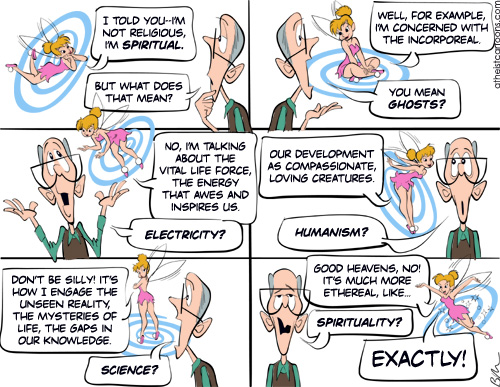I’ve had lots of talks with people about ‘spirituality’, and the one thing I’ve learned is that it’s important to figure out what they mean by that.
If by ‘spirituality’, they mean
- ‘a feeling of wonder and awe at the universe’, or
- ‘a sense of being interconnected with all things’, or even
- ‘a focus on worthwhile but non-material things, like relationships’
then they’ll get very little argument with me, because I like those things too.
If, however, by ‘spirituality’, they mean ‘a belief that our material reality is overlaid with an invisible realm of spirits and incorporeal beings’, then that’s just crap. Nobody has any evidence for that.
Well, Sam Harris is making an argument that we should be reclaiming the word ‘spiritual’ to refer to my first bracket of concepts above.
We must reclaim good words and put them to good use—and this is what I intend to do with “spiritual.” I have no quarrel with Hitch’s general use of it to mean something like “beauty or significance that provokes awe,” but I believe that we can also use it in a narrower and, indeed, more transcendent sense.
Of course, “spiritual” and its cognates have some unfortunate associations unrelated to their etymology—and I will do my best to cut those ties as well. But there seems to be no other term (apart from the even more problematic “mystical” or the more restrictive “contemplative”) with which to discuss the deliberate efforts some people make to overcome their feeling of separateness—through meditation, psychedelics, or other means of inducing non-ordinary states of consciousness. And I find neologisms pretentious and annoying. Hence, I appear to have no choice: “Spiritual” it is.
Neologisms (new words) may indeed be pretentious and annoying, but the reality is that they’re also very difficult to implement. It took a good 30 years for Richard Dawkins’ meme to catch on, and even then it’s likely to refer to a picture of a cat. Curse you, semantic shift!
What Harris doesn’t allow for is that reclaiming a word is very difficult as well. It only seems to work with taboo labels for people (queer and nigger come to mind), and only then to be used among people it was formerly applied to. It takes a lot of people to make this kind of change happen, and I just don’t see the impetus for it. If the word is moving at all, it’s moving toward that group of people who describe themselves as ‘spiritual but not religious’, meaning that they believe in a god, but not a church. And they’re much more numerous than us pantheistic-leaning Sagan fans.
I just don’t think ‘spirituality’ is a good choice to refer to the transcendent and ineffable. It’s so fuzzy and imprecise — it could mean anything. And that means that when you use it, you’re leaving yourself open to misinterpretation. Why use a word that you have to explain every time you use it?
Not only that, it’s going to be very difficult to uncouple the word from a set of associations people have about it; memories of being in a church, an implication that religion is positive. These are implications I don’t intend and don’t want to reinforce.
And of course, the link between the word ‘spirituality’ and supernaturalism is well-nigh insurmountable. It has ‘spirit’ at its root. How is someone not supposed to think of spirits whenever you use it?
Instead of trying to redeem the word ‘spiritual’ out of the muck of supernaturalism and religious tradition, why not use another word: transcendent. Or transcendence, if you need a noun to replace ‘spirituality’. These convey the transportive sense of wonder and awe most adequately.


1 July 2012 at 4:29 pm
I agree. Picking a word that means something else and then telling everyone "Well, to me it means X" shows poor communication skills, and is generally annoying.
The word "spirituality" can't help but come with the baggage of implying a belief in a (magical) "spirit" that is separate from the physical body (and maybe communes with other invisible spirits). It doesn't help to say "that's not what I mean by that" — just pick a word that people will understand in the first place!!
20 July 2012 at 7:33 am
Except the meaning of "spirituality" has been a long time slowly changing and almost already there in terms being used to refer to the feeling of wonder and awe and all those other possiblities you've mentioned.
4 September 2012 at 12:11 pm
There isn't much choice other than to attempt to reclaim the word. For example, if one does a search on "spirituality NHS" you find that the British health service uses the word quite a lot. We (Birmingham Humanists) went to a talk last night by one of the chaplains at Birmingham's main hospital and she loved using it. We cavilled. Don't you get emotional? She asked. She didn't seem to get that some people have a problem with the s-word. Any road up, they aren't going to stop using it so we're going to have to put up with it…
The word transcendent is even worse. It's the word I use to avoid using the word supernatural, since the latter makes no sense. (Everything is natural, so nothing can be supernatural.)
27 October 2012 at 2:26 pm
The choice seems to be, whether to allow for the word 'spiritual' to be synonymous with a neo-platonic dualist view of the world (in which there is a separate, spirit dimension, as the etymology suggests), or whether to broaden it to cover the whole spectrum of a certain aspect of human life, thereby not surrendering that aspect of humanity to the dualists with their tiny, ghastly gods and ghosts.
28 October 2012 at 5:08 am
I hear you, but reclamation isn't easy to pull off.